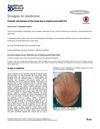15 citations
,
July 2021 in “JAMA Dermatology” Androgenetic alopecia negatively affects quality of life and self-esteem, especially in women, but not depression.
 3 citations
,
December 2020 in “International Journal of Women's Dermatology”
3 citations
,
December 2020 in “International Journal of Women's Dermatology” Scalp micro-wounding helps promote hair growth in female pattern hair loss.
4 citations
,
December 2020 in “Giornale italiano di dermatologia e venereologia” Italian guidelines recommend using trichoscopy for diagnosis and treatments like minoxidil for hair loss.
 15 citations
,
July 2020 in “Dermatologic Therapy”
15 citations
,
July 2020 in “Dermatologic Therapy” FPHL is common in women, influenced by genetics and hormones, and can be treated with medications, laser therapy, or hair transplantation.
 15 citations
,
April 2020 in “Journal of The American Academy of Dermatology”
15 citations
,
April 2020 in “Journal of The American Academy of Dermatology” Spironolactone effectively treats female pattern hair loss with few side effects.
 53 citations
,
August 2019 in “Journal of The American Academy of Dermatology”
53 citations
,
August 2019 in “Journal of The American Academy of Dermatology” Oral minoxidil and topical minoxidil 5% both effectively improve female-pattern hair loss with safe side effects.
 34 citations
,
October 2018 in “Journal of The American Academy of Dermatology”
34 citations
,
October 2018 in “Journal of The American Academy of Dermatology” Hormone treatments can help with women's skin and hair disorders, but they need careful monitoring and more research.
 66 citations
,
June 2018 in “International Journal of Women's Dermatology”
66 citations
,
June 2018 in “International Journal of Women's Dermatology” No cure for female pattern hair loss, but various effective treatments exist.
 58 citations
,
December 2017 in “Journal of The European Academy of Dermatology and Venereology”
58 citations
,
December 2017 in “Journal of The European Academy of Dermatology and Venereology” Microneedling can help stimulate hair growth, especially when used with other treatments, but it's not better than existing therapies.
 145 citations
,
November 2017 in “Journal of The European Academy of Dermatology and Venereology”
145 citations
,
November 2017 in “Journal of The European Academy of Dermatology and Venereology” Use minoxidil for hair loss treatment; assess results after 6 months.
 28 citations
,
October 2017 in “Journal of Cosmetic and Laser Therapy”
28 citations
,
October 2017 in “Journal of Cosmetic and Laser Therapy” Combining electrodynamic microneedle with 5% minoxidil improves hair growth and reduces hair loss in Chinese men.
 108 citations
,
August 2017 in “Clinical, Cosmetic and Investigational Dermatology”
108 citations
,
August 2017 in “Clinical, Cosmetic and Investigational Dermatology” Microneedling is promising for treating various skin issues but needs more research to confirm its effectiveness and safety.
 15 citations
,
January 2017 in “JAMA Dermatology”
15 citations
,
January 2017 in “JAMA Dermatology” Topical minoxidil improves female pattern hair loss, finasteride not effective, laser devices show mixed results.
 16 citations
,
July 2016 in “Journal of Dermatological Science”
16 citations
,
July 2016 in “Journal of Dermatological Science” Regenerated hairs can regain their color if the wound occurs during a certain stage of hair growth, and this process is helped by specific skin cells and proteins.
 68 citations
,
May 2015 in “Indian Journal of Dermatology”
68 citations
,
May 2015 in “Indian Journal of Dermatology” Microneedling can effectively promote new hair growth in men with hair loss who didn't improve with traditional treatments.
 32 citations
,
April 2015 in “British Journal of Dermatology”
32 citations
,
April 2015 in “British Journal of Dermatology” The hair shedding scale accurately identifies abnormal hair shedding in women with long hair, with grades 5 and 6 indicating excessive shedding.
 136 citations
,
January 2013 in “International Journal of Trichology”
136 citations
,
January 2013 in “International Journal of Trichology”  100 citations
,
June 2011 in “Journal of The American Academy of Dermatology”
100 citations
,
June 2011 in “Journal of The American Academy of Dermatology” 5% minoxidil foam once daily works as well as 2% minoxidil solution twice daily for female hair growth and is more convenient.
 126 citations
,
January 2010 in “British Journal of Dermatology”
126 citations
,
January 2010 in “British Journal of Dermatology” Baldness is more common in Chinese men than women, increasing with age, and is influenced by genetics.
 21 citations
,
January 2007 in “Australasian Journal of Dermatology”
21 citations
,
January 2007 in “Australasian Journal of Dermatology” Spironolactone and minoxidil together effectively treat female pattern hair loss.
 179 citations
,
March 2005 in “British Journal of Dermatology”
179 citations
,
March 2005 in “British Journal of Dermatology” Oral antiandrogens effectively treat female hair loss, with better results in higher hair loss grades.
 219 citations
,
March 2004 in “Journal of The American Academy of Dermatology”
219 citations
,
March 2004 in “Journal of The American Academy of Dermatology” 5% and 2% minoxidil solutions effectively promote hair growth and reduce hair loss, with 5% being slightly more effective but having more side effects.
 397 citations
,
February 2004 in “British Journal of Dermatology”
397 citations
,
February 2004 in “British Journal of Dermatology” Minoxidil boosts hair growth by opening potassium channels and increasing cell activity.
 269 citations
,
August 2002 in “Journal of The American Academy of Dermatology”
269 citations
,
August 2002 in “Journal of The American Academy of Dermatology” 5% minoxidil works better for hair growth and density, with minor irritation.
 157 citations
,
July 2001 in “British Journal of Dermatology”
157 citations
,
July 2001 in “British Journal of Dermatology” AGA more common in men, Koreans have lower rates and unique patterns.
 89 citations
,
January 2001 in “Dermatologic Surgery”
89 citations
,
January 2001 in “Dermatologic Surgery” Hair loss in women is common, starts in late 20s, and affects 30% of women over 50.
 6 citations
,
January 2001 in “Dermatologic Surgery”
6 citations
,
January 2001 in “Dermatologic Surgery” Female pattern alopecia is common, starts in late 20s, and is not androgen dependent.
 31 citations
,
November 2000 in “Clinical and Experimental Dermatology”
31 citations
,
November 2000 in “Clinical and Experimental Dermatology” WAA-QOL measures impact of hair loss on women's well-being.

































